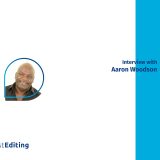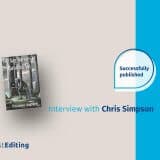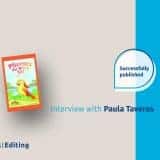
One thing every professional editor must be very clear about is the variant spellings and meanings of words known as homophones. According to The Merriam-Webster Dictionary, homophones can serve as “one of two or more words pronounced alike but different in meaning or derivation or spelling (such as the words to, too, and two).” Therefore, misspelling even one letter in a word can potentially lead to a change in meaning, sometimes one that is radically different from that originally intended by the writer.
Below is a list of some common homophones, which, for the most part, keep us professional editors on our toes (please note that all definitions below were taken from Merriam-Webster):
Homophones “a” to “h.”
1. allowed, aloud
allowed – “to assign as a share or suitable amount (as of time or money) <allow an hour for lunch>.”
aloud – “in a loud manner.”
2. bare, bear
bare – “lacking a natural, usual, or appropriate covering.”
bear – “any of a family (Ursidae of the order Carnivora) of large heavy mammals of America and Eurasia that have long shaggy hair, rudimentary tails, and plantigrade feet and feed largely on fruit, plant matter, and insects as well as on flesh.”
3. cite, sight, site
cite – “to call upon officially or authoritatively to appear (as before a court)”
sight – “something that is seen.”
site – “the spatial location of an actual or planned structure or set of structures (as a building, town, or monuments)”
4. desert, dessert
desert – “arid land with usually sparse vegetation.”
dessert – “a usually sweet course or dish (as of pastry or ice cream) usually served at the end of a meal.”
5. foreword, forward
foreword – “prefatory comments (as for a book) especially when written by someone other than the author.”
forward – “near, being at, or belonging to the forepart.”
6. groan, grown
groan – “to utter a deep moan indicative of pain, grief, or annoyance.”
grown – “cultivated or produced in a specified way or locality.”
7. hear, here
hear – “to perceive or apprehend by the ear.”
here – “in or at this place.”
Homophones “i” to “o.”
8. idle, idol
idle – “lacking worth or basis”
idol – “a representation or symbol of an object of worship”
9. jewel, joule
jewel – “an ornament of precious metal often set with stones or decorated with enamel and worn as an accessory of dress”
joule – “a unit of work or energy equal to the work done by a force of one newton acting through a distance of one meter”
10. know, no
know – “to perceive directly; have direct cognition of”
no – “used as a function word to express the negative of an alternative choice or possibility”
11. lie, lye
lie – “to be or to stay at rest in a horizontal position; to make an untrue statement with intent to deceive”
lye – “a strong alkaline liquor rich in potassium carbonate leached from wood ashes and used especially in making soap and for washing”
12. morning, mourning
morning – “the time from sunrise to noon”
mourning – “an outward sign (as black clothes or an armband) of grief for a person’s death”
13. nay, neigh
nay – “a negative reply or vote”
neigh – “to make the prolonged cry of a horse”
14. ode, owed
ode – “a lyric poem usually marked by exaltation of feeling and style, varying length of line, and complexity of stanza forms”
owed – “to have or bear (an emotion or attitude) to someone or something <owes the boss a grudge>”
Homophones “p” to “y.”
15. principal, principle
principal – “most important, consequential, or influential.”
principle – “a comprehensive and fundamental law, doctrine, or assumption.”
16. quarts, quartz
quarts– “a vessel or measure having a capacity of one quart.”
quartz – “a mineral consisting of silicon dioxide occurring in colorless and transparent or colored hexagonal crystals or in crystalline masses.”
17. rain, reign, rein
rain – “water falling in drops condensed from vapor in the atmosphere.”
reign – “the dominion, sway, or influence of one resembling a monarch <the reign of the Puritan ministers>.”
rein – “a strap fastened to a bit by which a rider or driver controls an animal.”
18. scene, seen
scene – “one of the subdivisions of a play”
seen – past participle of see – “to perceive by the eye.”
19. there, their, they’re
there – “in or at that place.”
their – “of or relating to them or themselves especially as possessors, agents, or objects of an action.”
they’re – “they are”
20. vial, vile
vial – “a small closed or closable vessel especially for liquids.”
vile – “morally despicable or abhorrent.”
21. weak, week
weak – “lacking strength.”
week – “any of a series of 7-day cycles used in various calendars.”
22. yoke, yolk
yoke – “a wooden bar or frame by which two draft animals (as oxen) are joined at the heads or necks for working together.”
yolk – “the yellow spheroidal mass of stored food that forms the inner portion of the egg of a bird or reptile and is surrounded by the white.”
Every so often, I will revisit this topic and provide more examples of common homonyms that professional editors encounter on a regular basis. Until then, acquaint yourselves with those listed above!
Originally posted 1/5/2009 and happily updated 11/14/2017. Thanks for reading!










